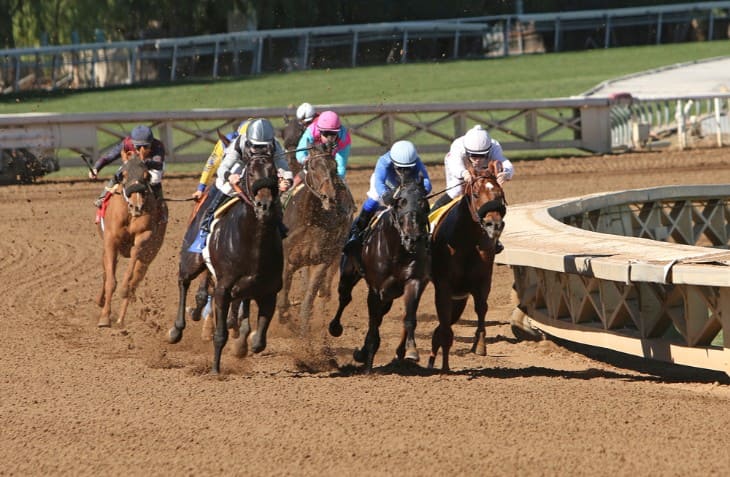What is Rule 4 in Horse Racing?
There is no one centralised “Rule 4” in horse racing. The numbering of rules and regulations may differ based on the jurisdiction, and the rules themselves are simply not consistent across all the different horse racing events. However, for British horse racing, it might be more common to encounter the use of the so-called Rule 4.
Rule 4 involves the deductions from the winning bets when a horse that bet is declared to be a non-starter. Whenever a horse is withdrawn from a race post-betting, Bookmakers offer Rule 4 deductions from winning bets to cover the reduced competition and an advantage to the bettors who have nothing to do with the affected race.
Purpose of Rule 4
The main function of Rule 4 within horse racing is to maintain the principle of fairness and integrity in betting, more specifically, to offset the unfair advantage of participants who have wagered on certain horses that have subsequently been withdrawn from the competition. Demonstratively, when a racehorse is declared a non-runner, the market's perception of the competition changes significantly with the system being unable to maintain a balance in this case. Those who have already placed their bets on the competition made their choice based on the horse racing of a particular set of entries. In case it is withdrawn and their stake is eliminated, the whole dynamics of the race changes, with the previous concern having an unfair advantage.
Rule 4 is used to address this issue by revising the participants’ odds and the deductions from those who set their bets before the non-runner status, with the latter factor reflecting the change circumstance. Furthermore, the Rule serves to oppose the deliberate attempts of connections to schedule late non-running. If such deductions did not exist, the owners and trainers would have much motivation to abuse the system by pulling their entries at the last minute to diminish the chances of the rest of the field or capture attention from their other horses. Rule 4 acts as a disincentive for such behaviour, promoting the fair discipline of the racehorse connections, and overall maintaining the fairness of the competition market.
Deductions from Winnings
Horse racing uses deductions from winnings under Rule 4 as a mechanism to adjust the potential payouts to bettors. The changed circumstances are always associated with a horse’s withdrawal from a race. The point of these deductions is, therefore, to accommodate the new odds and to keep the betting market’s integrity intact. The amount to be deducted depends on the odds the withdrawn horse had at the time of its withdrawal. If the horse was likely to win due to the short odds, the deductions are higher. The longer the odds, the less probable it was for the horse to win, which means the deduction attributable to such a horse’s withdrawal will be relatively smaller.
These deductions ensure that those who placed their bets before a horse’s withdrawal are not subject to an unfair disadvantage or advantage. By adjusting the potential payouts, Rule 4 accommodates the new odds and therefore new probabilities, which promotes the bettors’ informed choice. A similar mechanism is likely to prevent odds manipulation from insiders who may impact the bets without it. Hence, Rule 4 is likely to enhance horse racing’s credibility as a betting sport.
Factors That Influence Deductions:
The deduction itself depends on the odds of the horse at the time of the withdrawal. The shorter the odds, the higher the deduction will be. Here's how this works:
- Shorter Odds, Higher Deductions: The shorter the odds, the higher the deduction will be. The logic is simple: if the odds were relatively short, such as 2/1 or 3/1, bookmakers believed in the horse’s chances of winning. Therefore, when withdrawn, that much more changes in the race, and winning significantly decreases.
- Longer Odds, Smaller Deductions: If, however, the horse’s odds were long, such as 10/1 or 20/1, the deduction is minimal. In this case, the conclusion is the reverse of the previous one. Horses with long odds had a much lower chance of success, so their withdrawal affected the race result to a lesser extent.

Multiple Withdrawals
Finally, handling multiple withdrawals separately is critical due to the need to ensure the accuracy and fairness of the process. More specifically, the betting rules related to Rule 4 require the distinction of each withdrawal and individual assessment of its impact on the overall process. Every withdrawn horse leads to a separate offset from the winnings; this factor is calculated using the odds of that horse at the withdrawal. As a result, if several horses are declared non-runners, and each has its own unique odds, the multiple deductions will be the sum of the individual deductions.
- Essentially, the more withdrawals there are, especially high-profile ones, the more money the bettors who placed bets before the withdrawals lose from their respective wins.
- Returning to the example, upon a late withdrawal of H1, the winnings for a successful £30 bet would be reduced by 10 pence. Multiple withdrawals can result in more dramatic changes in winnings, but the application of this approach ensures that the impact of each withdrawal is analysed and reflected.
- Therefore, the current approach compensates or punishes based on the impact of changes, which is fair to all participants and maintains transparency. This is one of the reasons why keeping track of race progress is vital for bettors; any changes, especially multiple ones, can significantly impact the potential returns.
Total Deduction
When more than one horse is declared a non-runner in the same race, the withdrawals trigger separate deductions, and the payout is determined as the total of these separate deductions. This explanation implies that in the case when non-runners include a few horses with rather low odds, the total deduction could be high enough to significantly impact the expected return for the bettors that worked out with the higher pre-withdrawal odds.
Looking at the total deduction values is critical for bettors because this value states precisely how much less money they would win if their horse won the race. This knowledge emphasises that awareness of the race conditions and monitoring odds changes is critical, especially when late withdrawals are common or involve horses that were intensely bet to win. The total deduction value emphasises the importance of tracking real-time odds changes for gamblers as it allows them to understand the potential returns change due to withdrawal and make conscious choices.
Importance of Checking Odds and Deductions
Lastly, checking the odds and deductions is extremely important for horse racing bettors because these factors significantly affect the wagers’ profitability and fairness. Bettors should always check the current odds and potential Rule 4 deductions for a race before betting. The odds not only reflect the market’s implied chances of a horse winning but also help bettors make an informed decision. But they also directly influence the payout: in other words, the odds reflect the winnings a bettor receives from a bookmaker. Therefore, bettors should always review their odds and identify the cases when they believe the odds are worth the investment.
Understanding Rule 4 deductions is also critical because bettors need to know how much they stand to gain from a wager. If they are not aware of potential deductions due to late withdrawals, they are likely to be upset by the lower-than-expected payouts. In contrast, knowing about Rule 4 deductions helps the players assess the impact of withdrawals, choose to change their bet amount, or decide to pick another horse that avoids the deduction. Ultimately, checking the odds and deductions is one of the most important parts of responsible betting knowledge for knowledgeable bettors who aim to make consistent profits in horse racing.

Jurisdictional Differences
In the context of horse racing, jurisdictional differences generally refer to the differences in rules, regulations, and practices between different racing authorities or geographical areas where the sport is practised. These differences may relate to just about anything, including the format of the race, conditions for eligibility of the horse and/or the rider, the drug testing regime, or even how the bookmakers calculate the Rule 4 deductions.
Thus, it is vital for both a bettor and a participant to be aware of these differences as they impact how races are conducted and how bets are valued in the process. Indeed, it is also possible that a certain action or a rule is allowed in one jurisdiction and is restricted in another virtually identical one. Therefore, it is important to familiarise oneself with a particular racing authority or race course’s rules if one intends to bet or partake in the race. This will ensure that everyone within the industry is on the same page and do their business in a fair and equitable manner.
Staying Informed
Since the rules and regulations relating to horse racing are subject to changes and amendments, it is crucial for bettors to inquire about the most recent rules and deductions established or amended by the official racing authority or the racecourse at which they are deciding to place their money.
Summary
To sum up, horse racing’s Rule 4 is a provision to even the odds and reduce payouts in case horses are withdrawn from the contest once the betting is active. The deduction rate varies according to the odds of the removed horse, and the shorter the odds, the more winnings would be deducted if a related horse is withdrawn. Thus, punters should consider these stipulations when planning their bets.
For more information:







